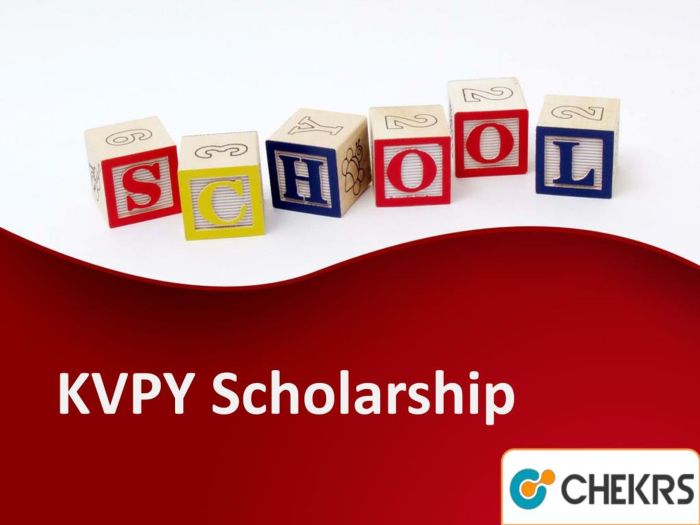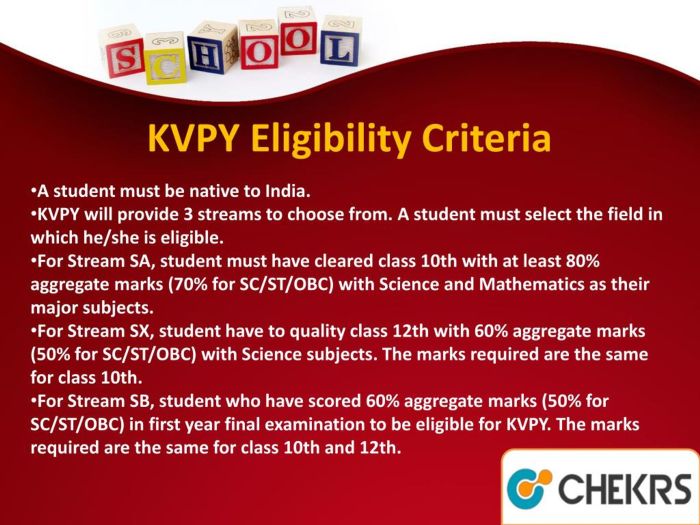KVPY Scholarship represents a prestigious opportunity for aspiring Indian scientists. This program, established to nurture scientific talent, has a rich history and a rigorous selection process. Understanding its intricacies, from eligibility criteria to exam preparation strategies, is crucial for success. This guide delves into every aspect of the KVPY scholarship, providing a comprehensive overview for prospective applicants.
We will explore the program’s evolution, the different streams available (SA, SX, SB), and the detailed selection process. We’ll also examine the financial benefits and perks offered, providing insights into effective study strategies and time management techniques. Success stories of past KVPY scholars will illustrate the impact of this scholarship on academic and career paths, inspiring future generations of scientists.
KVPY Exam Structure and Preparation

The Kishore Vaigyanik Protsahan Yojana (KVPY) exam is a highly competitive scholarship program for students pursuing basic sciences. Success hinges on a well-structured preparation strategy tailored to the exam’s format and the student’s individual strengths and weaknesses. Understanding the exam structure and employing effective study techniques are crucial for maximizing your chances of securing a KVPY scholarship.
KVPY Exam Structure by Stream
The KVPY exam is conducted in two stages: Aptitude Test and Interview. The Aptitude Test assesses the candidate’s understanding of Physics, Chemistry, Mathematics, and Biology (for SA stream only). The weighting and specific topics covered vary slightly depending on the stream (SA, SX, SB). The SA stream (for students in Class 11) includes Biology, while the SX and SB streams (for students in Class 12) do not. The difficulty level also increases from SA to SX and SB. The Interview round assesses the candidate’s aptitude and scientific reasoning.
Effective Strategies for Each Section
Preparing for each section requires a focused approach. For Physics, a strong foundation in concepts and problem-solving is essential. Practice a wide range of problems, focusing on understanding the underlying principles rather than rote memorization. For Chemistry, a balance of theoretical knowledge and practical application is key. Mastering stoichiometry, organic reactions, and periodic trends are crucial. Mathematics requires consistent practice and a deep understanding of fundamental concepts. Focus on problem-solving strategies and techniques. Finally, for Biology (SA stream), thorough understanding of fundamental concepts in botany, zoology, and cell biology is important. Practice diagrams and biological processes.
The KVPY scholarship is a prestigious program in India, offering significant financial and academic support to promising young scientists. For students seeking similar opportunities in the United States, exploring options like the promise scholarship might be beneficial. Ultimately, both scholarships aim to nurture talent and foster future advancements in scientific fields, albeit within different national contexts.
Sample Study Plans
Study plans should be tailored to individual needs and prior knowledge. A student with a strong foundation can focus on advanced problem-solving and exam-style practice. A student needing to build foundational knowledge should allocate more time to fundamental concepts and textbook study. The following are examples and should be adapted.
Beginner (Weak Foundation): Dedicate 60% of study time to fundamental concepts, 30% to practice problems, and 10% to review. Focus on understanding basic principles before tackling complex problems.
Intermediate (Moderate Foundation): Allocate 40% of study time to advanced concepts, 40% to practice problems, and 20% to review and mock tests. Regularly test your understanding through practice problems.
Advanced (Strong Foundation): Focus 70% of study time on advanced problem-solving and mock tests, 20% on reviewing weak areas, and 10% on refining techniques.
Syllabus and Difficulty Comparison Across Streams
| Aspect | SA (Class 11) | SX (Class 12, Science) | SB (Class 12, Biology) |
|---|---|---|---|
| Physics | Class 11 syllabus | Class 11 & 12 syllabus, more advanced | Class 11 syllabus, less emphasis |
| Chemistry | Class 11 syllabus | Class 11 & 12 syllabus, more advanced | Class 11 syllabus, less emphasis |
| Mathematics | Class 11 syllabus | Class 11 & 12 syllabus, more advanced | Not applicable |
| Biology | Class 11 syllabus | Not applicable | Not applicable |
| Overall Difficulty | Moderate | High | High (Biology focused) |
Importance of Time Management and Problem-Solving Skills
Effective time management is crucial during the exam. Practice solving problems under timed conditions to improve speed and accuracy. Develop strategies for identifying and tackling easier questions first to maximize your score. Strong problem-solving skills are essential for success. Learn to approach problems systematically, break down complex problems into smaller parts, and identify relevant concepts and formulas.
Effective time management and efficient problem-solving skills are the cornerstones of success in the KVPY exam.
Resources and Support for KVPY Aspirants

Navigating the KVPY exam requires a strategic approach to learning and access to appropriate resources. Success hinges not only on individual effort but also on the support systems available to guide and encourage aspirants. This section Artikels key resources and support structures that can significantly improve your chances of success.
Recommended Study Materials
Choosing the right study materials is crucial for effective KVPY preparation. A balanced approach combining textbooks, online resources, and potentially coaching materials will be beneficial. Carefully select resources that align with the syllabus and your learning style.
- Textbooks: Standard textbooks for class XI and XII, especially those focusing on Physics, Chemistry, and Mathematics, form the foundation. Consider reputable publications like NCERT textbooks, along with supplementary books from authors known for their clear explanations and comprehensive coverage. For Biology, refer to standard biology textbooks used in the respective boards.
- Online Resources: Websites and online platforms offering practice questions, video lectures, and interactive learning modules are invaluable. Many educational websites and YouTube channels provide free and paid KVPY-specific preparation materials. Khan Academy, for example, offers a wealth of educational resources across various scientific subjects.
- Coaching Centers: While not mandatory, some students benefit from the structured environment and expert guidance offered by coaching centers specializing in KVPY preparation. These centers often provide comprehensive study materials, mock tests, and personalized feedback.
Benefits of Study Groups and Online Communities
Collaborative learning significantly enhances the KVPY preparation journey. Study groups and online communities foster a supportive environment for knowledge sharing and problem-solving.
Participating in study groups allows you to discuss complex concepts, clarify doubts, and learn from peers’ perspectives. Online communities provide access to a wider network of aspirants, enabling you to share resources, discuss strategies, and stay motivated throughout the preparation process. The collective brainstorming and peer learning can be incredibly effective in identifying and addressing weaknesses.
Role of Mentors and Guidance Counselors
Mentors and guidance counselors play a crucial role in guiding KVPY aspirants. Their expertise and experience can provide invaluable support in navigating the application process and developing a personalized study plan.
Mentors, often experienced professionals or educators, offer personalized guidance, addressing individual strengths and weaknesses. Guidance counselors can help manage the stress of preparation, provide emotional support, and assist in choosing appropriate study materials and strategies. Their role extends beyond academics, encompassing career counseling and overall well-being.
Applying for the KVPY Scholarship
The KVPY application process involves several steps, requiring careful attention to detail and adherence to deadlines. Thoroughly review the official KVPY website for the most up-to-date information and instructions.
The application typically involves online registration, filling out a detailed application form, providing academic records, and submitting the required documents. Applicants need to carefully select their preferred stream (SA, SB, SX) based on their academic background and aspirations. Meeting deadlines is paramount, and it is recommended to start the application process well in advance to avoid last-minute rush and potential errors. After the application is submitted, candidates need to prepare for the aptitude test and the subsequent interview process (if applicable).
The KVPY Scholarship is more than just financial aid; it’s a gateway to a vibrant scientific community and a launchpad for ambitious research careers. By understanding the program’s structure, preparing effectively, and leveraging available resources, aspiring scientists can significantly increase their chances of success. This comprehensive guide aims to equip you with the knowledge and tools needed to navigate this challenging yet rewarding journey. The ultimate goal is to empower you to contribute significantly to India’s scientific landscape.
Question Bank: Kvpy Scholarship
What happens if I don’t qualify for the fellowship but perform well in the exam?
KVPY offers scholarships to the top performers, but even if you don’t receive a fellowship, a good performance can still be a valuable credential on your academic record.
Are there any age restrictions for applying?
Yes, specific age limits apply to each stream (SA, SX, SB). Check the official KVPY website for the most up-to-date information.
Can I apply if I’m studying in a private institution?
Yes, students from both private and public institutions are eligible to apply, provided they meet all other eligibility criteria.
What if I have questions during the application process?
The KVPY website usually has a contact section or FAQ page to address application-related queries. You can also seek guidance from your school or college.